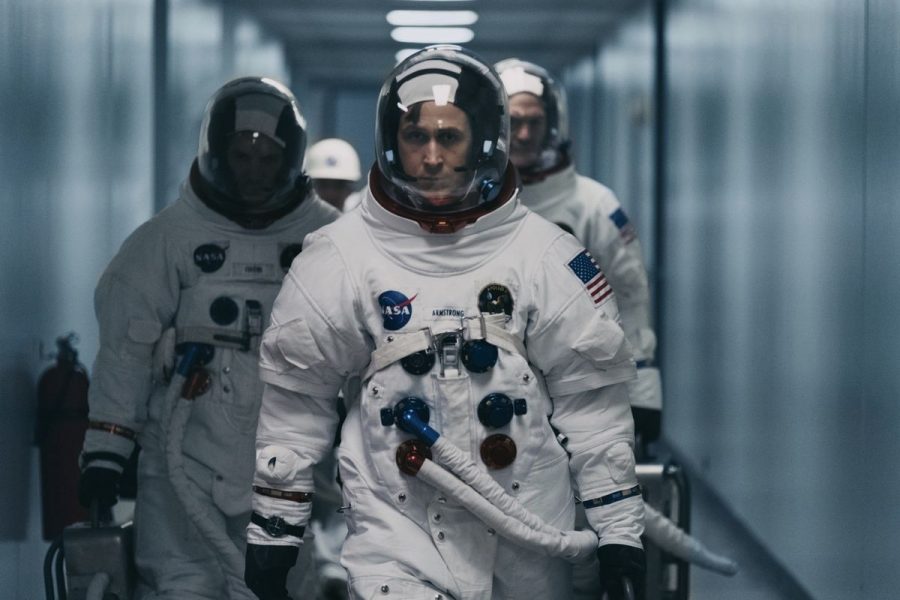Everybody has their biases — if a film is a glimpse of our world through the eyes of its director, then this statement rings true in cinema. However, the expression of personal opinion can sometimes become so overt and unchallenged in perspective that it crosses a fine line and becomes propaganda.
After Oscar-winning director Damien Chazelle’s Neil Armstrong biopic “First Man” was screened at the Venice Film Festival this past August, a controversy broke out not over the content of the film, but over what was left out. While the film reportedly displays American flags in several shots, there is no scene that explicitly shows Neil Armstrong (Ryan Gosling) planting the American flag on the moon.
Those who take issue with the film say its failure to include this pivotal moment is unpatriotic. But the film is about a man, not necessarily a nation. While Hollywood has been known to produce jingoistic pictures in the past, like “Top Gun,” or even “The Patriot,” is it ever a film’s duty to serve as a vessel for patriotism?
Chazelle wanted to make a film that reflected the broader thematic implications of the moon landing rather than its historical or political context.
“It felt like another variation on that theme of what the price of pursuing a goal like that is on the individual, on the people around them,” he said in an interview with the Los Angeles Times.
This nuanced focus likely makes the film more poignant and original than it would be if it served merely as a patriotic vehicle to regurgitate images that nearly every American has already had seared into their consciousness through history class and political propaganda. Many other films have tackled classic American narratives with varying degrees of patriotism. Like “First Man,” these films often focus on the achievements of individuals, dubbed American heroes.
While it is still often grim and harrowing, Clint Eastwood’s “American Sniper” is thoroughly patriotic because it portrays one of America’s most lethal snipers as a hero. Through the patriotic American lens, he is not killing innocent people, but nobly protecting his country from terrorism. Clint Eastwood also directed “Sully” and this year’s “15:17 to Paris,” both of which portray the very American trope that an ordinary man can rise up and save lives through extraordinary acts of valor.
On the other hand, films like “Hidden Figures” also depict the achievements of American heroes, but use the film as a vehicle to illuminate a new story rather than retell the same one. Director Theodore Melfi’s film hones in on the lives of three African-American mathematicians at NASA who worked on the revolutionary launch of astronaut of John Glenn. While the film still highlights American excellence for the greater good of the country, it does so in a way that makes the audience reconsider their own values and history.
Though Neil Armstrong is certainly not unrecognized, “First Man” has a somewhat similar ambition to a film like “Hidden Figures.” By taking a character-driven approach instead of focusing on a larger narrative of the nation, it sheds light on the unknown story that unfolded around the iconic moment of the American flag being planted on the moon.
However, those opposed to “First Man” did not feel so beholden to Armstrong’s personal legacy. In a tweet, Republican Senator Marco Rubio described the decision to leave out the flag planting as “total lunacy” and “a disservice at a time when our people need reminders of what we can achieve when we work together,” noting that the moon landing mission was paid for by Americans and accomplished using American technology and workers.
In a press conference, Gosling emphasized the focus on people rather than a nation.
“I think this was widely regarded in the end as a human achievement [and] that’s how we chose to view it,” he said.
According to Gosling, the filmmakers’ decision also reflects what Neil Armstrong would have wanted.
“I don’t think that Neil viewed himself as an American hero,” he said in the same press conference. “From my interviews with his family and people that knew him, it was quite the opposite. And we wanted the film to reflect Neil.”
Yes, Neil Armstrong was an American. But before that, he was an individual. And what makes us connect so viscerally with characters on screen is not a shared nationality, but the common experience of the human condition.
Through “First Man,” Chazelle attempts to give audiences a fresh perspective on an iconic event. He is not erasing history to push an anti-American agenda, but rather, giving a delicate, personal perspective on a human achievement that has become so much larger than the man who accomplished it.
A version of this article appeared in the Tuesday, Oct. 9 print edition. Email Taylor Stout at [email protected].


























































































































































